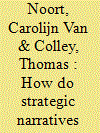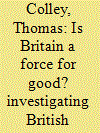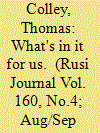|
|
|
Sort Order |
|
|
|
Items / Page
|
|
|
|
|
|
|
| Srl | Item |
| 1 |
ID:
181958


|
|
|
|
|
| Summary/Abstract |
Insurgencies are routinely conceptualised using a binary opposition between states and rebels. However, this neglects the complexity of their interaction, especially their collaboration. Although rebel-state collaboration is found throughout the history of insurgency, we lack a full explanation of why it occurs. This article endeavours to take the first step in developing a comprehensive theory by analysing rebel-state collaboration in two heuristic case studies: Afghanistan and Syria. Through process tracing, we find four mechanisms that can explain collaboration: 1) to prevent a costly military stalemate, 2) to gain or maintain legitimacy, 3) because external threats incentivise a mutually beneficial alliance, and 4) because both have to operate under the constraints of the pre-existing political economy. The relative weight of each varies, reflecting the fluid and contextual nature of wartime political orders. Contrasting with more popular explanations, we argue rebels and states are willing to collaborate even when the other benefits too, providing they believe their relative gains would be higher than their opponents, or the costs of competing would be too large. In providing a fuller explanation of rebel-state collaboration, we advocate a rethink about how to capture and analyse the complex and dynamic interactions between rebels and states.
|
|
|
|
|
|
|
|
|
|
|
|
|
|
|
|
| 2 |
ID:
179319


|
|
|
|
|
| Summary/Abstract |
Strategic narratives are increasingly considered important for domestic and international support for foreign policy. However, debate continues about why some strategic narratives successfully shape policy outcomes, while others are rejected. How states construct strategic narratives is well established. We know less about how states appropriate the strategic narratives of others, and the role this plays in policy adoption. Addressing this, we introduce a theoretical framework to trace the relationship between strategic narratives and policy adoption. Its central premise is that a state is more likely to adopt a new policy if it can strategically narrate about it in a way that promises material gain but without undermining its ontological security. We test our framework using states’ responses to China's Belt and Road Initiative (BRI). Examining the Second Belt and Road Forum in 2019, we trace how far China's strategic narratives are appropriated by multiple states – Kazakhstan, Italy, United Kingdom, Netherlands, United States, India, and Mexico. Countries appropriate China's narrative emphasis on connectivity, trade, and prosperity. However, they contest that China's intentions are benign, based on its human rights record, assertive foreign policy, and fears of indebtedness. Finally, we discuss our framework's utility in explaining what makes strategic narratives persuasive in International Relations.
|
|
|
|
|
|
|
|
|
|
|
|
|
|
|
|
| 3 |
ID:
151394


|
|
|
|
|
| Summary/Abstract |
It is commonly assumed in the foreign policy literature that narratives are uniquely persuasive and thus integral to obtaining public support for war. Yet, empirical research on “strategic narrative” is often vague on both the concept of narrative and how it persuades. Moreover, the stories publics use to interpret war are rarely examined. This paper offers a novel approach to studying “from the ground up” the war stories of individual British citizens. It examines public interpretations of war through emplotment: the way people select and link events to create a coherent story. Examining the wars people include and those they silence, it illustrates how a diverse range of citizens morally evaluates Britain’s military role, be it as a Force for Good, a Force for Ill or a country Learning from its Mistakes. In doing so, the paper offers an alternative methodological approach to studying how individual citizens understand war.
|
|
|
|
|
|
|
|
|
|
|
|
|
|
|
|
| 4 |
ID:
140951


|
|
|
|
|
| Summary/Abstract |
Public support for military interventions is both critical to secure and invariably difficult to maintain. While foreign-policy specialists frequently underscore the importance of having a compelling strategic narrative to legitimise military intervention, most studies fail to explain how transmitted government narratives are actually mediated by the press and ultimately received by the public. Thomas Colley examines the public's response to the UK's strategic narrative on the 2011 military intervention in Libya, assessing the UK government's use of several strands in its messaging and exploring how these were mediated and received by the British media and public.
|
|
|
|
|
|
|
|
|
|
|
|
|
|
|
|
|
|
|
|
|